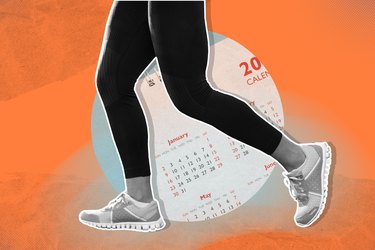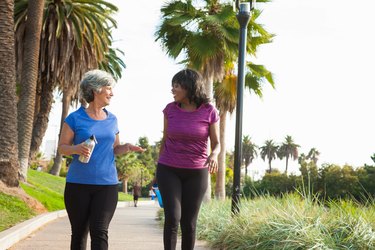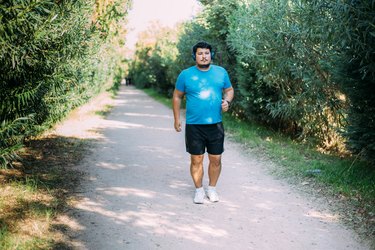
Think back to your last meal. What did you do right afterward? If you're like most of us, it probably involved a whole lot of sitting — whether you drove to work right after breakfast, sat at your computer during lunch or crashed on the couch post-dinner.
But get this: Taking just a short walk after eating (think: around the block or to the mailbox) is associated with a slew of health benefits, like speeding up your metabolism and lowering your blood sugar.
Video of the Day
Video of the Day
Here, four reasons to cap off your meal with some movement.
4 Benefits of Taking a Walk After a Meal
1. Your Blood Sugar Levels Will Stabilize
First, a quick biology refresh: When you eat carbs, your body breaks them down into sugars during digestion. As the sugar enters your bloodstream, your blood sugar levels rise. In response, your body releases insulin, which allows your cells to absorb and store the sugar. Your blood sugar levels then decline as the sugar is absorbed into the cells.
While avoiding sugary or high-glycemic foods (namely, simple carbs) can help modulate blood sugar levels, taking a stroll after a meal can also do the trick.
A February 2022 review in Sports Medicine found a few minutes of light-intensity walking after a meal significantly reduced spikes and crashes in blood sugar a couple of hours after eating compared to sitting post-meal. (Standing somewhat moderated blood sugar.)
"Walking triggers the body to burn calories rather than hold on to them," says Shaham S. Mumtaz, MD, gastroenterologist at Northwestern Medicine Central DuPage Hospital. "This stimulates the stomach and bowels to process the foods you have eaten more quickly, which means that the sugars are absorbed at a steady rate [instead of] spiking."
Over time, if you kept up the habit, this may contribute to diabetes prevention and longer-term blood sugar control for people who already have diabetes.
2. You'll Digest Your Meal Faster
"Walking after eating increases your metabolism," Dr. Mumtaz says. "This stimulates your stomach and bowel to break down foods more quickly and move them through your bowel efficiently."
Speedier digestion has numerous payoffs. According to Harvard Health Publishing, the faster your metabolism, the more calories you'll burn. "Studies have shown that some people see more effective weight loss or less weight gain with walking after a meal," Dr. Mumtaz says.
And that's not all. A 2017 study in Digestion suggests zippier digestion is associated with improved acid reflux and heartburn in people assigned female at birth.
Plus, it can give you a zing of energy. "When you are not active and the bowel does not move as quickly, it can make you sluggish," Dr. Mumtaz says.
3. You'll Feel Less Bloated and Gassy
If you have tummy trouble, a postprandial jaunt can be just what the doctor ordered. In a small 2021 study in Gastroenterology and Hepatology from Bed to Bench, walking for 10 to 15 minutes following a meal reduced GI distress, including belching, gas, bloating and cramping.
Here's why: During digestion, microorganisms in your bowel break down your food, producing gas as a natural byproduct. This gas eventually exits the body in the form of a burp or fart (excuse us!).
By taking a walk after eating, you'll digest your food faster, so it won't spend as much time marinating in bacteria. "Limiting interaction with bacteria in the bowel can help decrease the amount of gas buildup," Dr. Mumtaz says. It also reduces exposure to digestive juices like gastric acid. Lower levels of gas and acid equals reduced flatulence and belching.
"Also, by stimulating the bowel to move more quickly, there is less of a backup [of feces] within the GI tract," Dr. Mumtaz says. "This should prevent stretching of the bowel, which can cause bloating as well."
4. You Could Lower Inflammation
The ability of a post-meal walk to help modulate blood sugar could also make it a contender for lowering inflammation, concluded a January 2023 review in Sports Medicine. The review looked at eight studies and found that in all of them, physical activity after a meal reduced big fluctuations in blood sugar.
Blood sugar spikes and drops are often inflammatory, and chronic inflammation is behind a lot of diseases. Researchers for the 2023 Sports Medicine review found that, though more research is needed, there's promising early evidence that exercise after a meal might lower the risk for diseases caused by low-grade inflammation.
When to Get Moving
The sooner the better. "Immediately after eating is the best time, but up to 60 minutes after finishing your meal is reasonable," Dr. Mumtaz says. A small June 2016 study in Diabetology International had people walk one hour after chowing down and showed blood sugar improvements without any side effects, and the 2023 Sports Medicine review concluded right away is best.
Still, while it's not necessary to book it out the door, don't hold off too long. "After a few hours, the food has made its way to the small bowel," Dr. Mumtaz says. "At this point, physical activity can divert blood flow away from the bowels that are working to digest and absorb food. This can cause an upset stomach, cramping or nausea."
How Long to Walk
It doesn't take much to reap the rewards of walking. "Usually about 15 to 20 minutes of walking will be more than adequate," Dr. Mumtaz says. "This can be spread out in short intervals as well."
In the 2022 Sports Medicine review, folks who strolled for just 2 to 5 minutes had lower blood sugar levels.
The Best Walking Speed
For maximum payoff, pick up your pace a bit more than usual. The Diabetology International study found walking 10 percent faster than your natural gait had a bigger effect on reducing blood sugar.
But we're not talking a power walk. "It does not take very much activity to stimulate the bowel and stomach to move," Dr. Mumtaz says. "Overdoing it may divert blood flow away from the bowel and lead to poor digestion of food, causing an upset stomach or heartburn."
- Sports Medicine : "The Acute Effects of Interrupting Prolonged Sitting Time in Adults with Standing and Light-Intensity Walking on Biomarkers of Cardiometabolic Health in Adults: A Systematic Review and Meta-analysis"
- Digestion: "Gender Difference of Gastric Emptying in Healthy Volunteers and Patients with Functional Dyspepsia"
- Gastroenterology and Hepatology from Bed to Bench: "The effect of a short-term physical activity after meals on gastrointestinal symptoms in individuals with functional abdominal bloating: a randomized clinical trial "
- Diabetology International : "Acute effect of fast walking on postprandial blood glucose control in type 2 diabetes"




